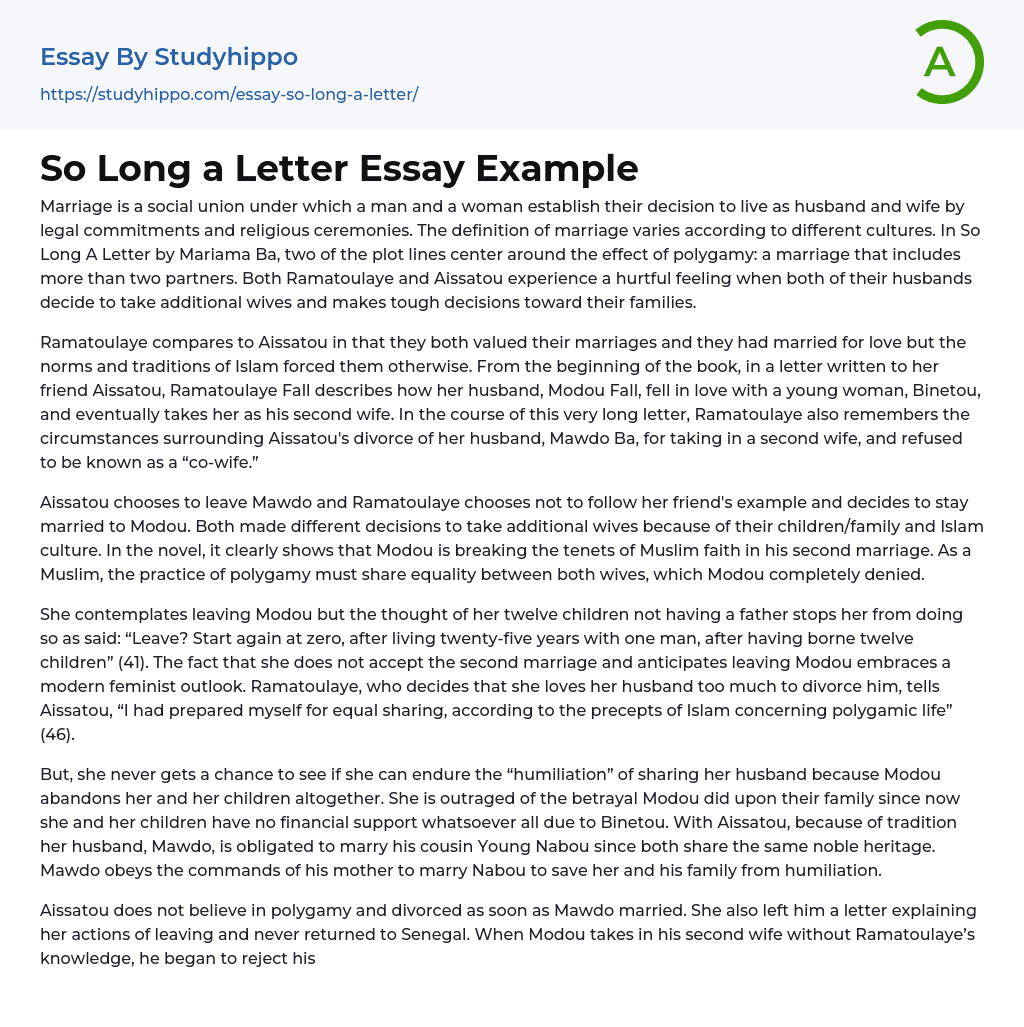Marriage is a social union under which a man and a woman establish their decision to live as husband and wife by legal commitments and religious ceremonies. The definition of marriage varies according to different cultures. In So Long A Letter by Mariama Ba, two of the plot lines center around the effect of polygamy: a marriage that includes more than two partners. Both Ramatoulaye and Aissatou experience a hurtful feeling when both of their husbands decide to take additional wives and makes tough decisions toward their families.
Ramatoulaye compares to Aissatou in that they both valued their marriages and they had married for love but the norms and traditions of Islam forced them otherwise. From the beginning of the book, in a letter written to her friend Aissatou, Ramatoulaye Fall describes how her husband, Modo
...u Fall, fell in love with a young woman, Binetou, and eventually takes her as his second wife. In the course of this very long letter, Ramatoulaye also remembers the circumstances surrounding Aissatou's divorce of her husband, Mawdo Ba, for taking in a second wife, and refused to be known as a “co-wife.”
Aissatou chooses to leave Mawdo and Ramatoulaye chooses not to follow her friend's example and decides to stay married to Modou. Both made different decisions to take additional wives because of their children/family and Islam culture. In the novel, it clearly shows that Modou is breaking the tenets of Muslim faith in his second marriage. As a Muslim, the practice of polygamy must share equality between both wives, which Modou completely denied.
She contemplates leaving Modou but the thought of her twelve
children not having a father stops her from doing so as said: “Leave? Start again at zero, after living twenty-five years with one man, after having borne twelve children” (41). The fact that she does not accept the second marriage and anticipates leaving Modou embraces a modern feminist outlook. Ramatoulaye, who decides that she loves her husband too much to divorce him, tells Aissatou, “I had prepared myself for equal sharing, according to the precepts of Islam concerning polygamic life” (46).
But, she never gets a chance to see if she can endure the “humiliation” of sharing her husband because Modou abandons her and her children altogether. She is outraged of the betrayal Modou did upon their family since now she and her children have no financial support whatsoever all due to Binetou. With Aissatou, because of tradition her husband, Mawdo, is obligated to marry his cousin Young Nabou since both share the same noble heritage. Mawdo obeys the commands of his mother to marry Nabou to save her and his family from humiliation.
Aissatou does not believe in polygamy and divorced as soon as Mawdo married. She also left him a letter explaining her actions of leaving and never returned to Senegal. When Modou takes in his second wife without Ramatoulaye’s knowledge, he began to reject his first marriage of twenty-five years with Ramatoulaye and her children. After being rejected by her husband, she must still carry on the role of being a mother (now as a single mother).
Ramatoulaye devotes her time and effort to her children since she finds, “joy and sadness together: joy in being loved by my
children, the sadness of a mother who does not have the means to change the course of events” (56). She is still getting used to being on her own as a single mother but knows her children come first before anything. As for Aissatou, she thought divorcing was the best idea for herself and her children to provide better lives for them.
She does not want her children to experience the pain of polygamy so she later leaves Senegal with her four sons and moves to the United States to start over. Ramatoulaye and Aissatou’s family in many ways did not work in the way they both wanted to. For the love of their husbands, both had to make tough decisions that affected their children as well. Both women who seeked to marry for love was stumbled upon by tradition, Ramatoulaye because her husband manipulated the laws of Islam to satisfy the lust born of a mid-life crisis, and Aissatou because her husband followed the commands of his mother.
- Boo Radley essays
- Genesis essays
- Richard iii essays
- Alice in Wonderland essays
- On the road essays
- Ozymandias essays
- The Nightingale essays
- Holden Caulfield essays
- Animal Farm essays
- 1984 essays
- A Hanging essays
- Shooting An Elephant essays
- A Tale Of Two Cities essays
- Adventures Of Huckleberry Finn essays
- Arthur Conan Doyle essays
- Brave New World essays
- Characters In Hamlet essays
- Characters In Romeo And Juliet essays
- Desdemona essays
- Diary Of A Wimpy Kid essays
- First-Person Narrative essays
- Frankenstein essays
- Heart Of Darkness essays
- Jane Eyre essays
- Jay Gatsby essays
- King Duncan essays
- Librarian essays
- Little Red Riding Hood essays
- Lord Of The Flies essays
- Silas Marner essays
- The Cask Of Amontillado essays
- The Catcher In The Rye essays
- The Crucible essays
- The Handmaid's Tale essays
- The Reader essays
- Virgil essays
- Wuthering Heights essays
- Candide essays
- Castle essays
- J. D. Salinger essays
- Ulysses essays
- Ethan Frome essays
- In Cold Blood essays
- Outliers essays
- Tuesdays With Morrie essays
- The Art of War essays
- Wife of Bath essays
- Huckleberry Finn essays
- The Lady With The Dog essays
- Great Expectations essays




